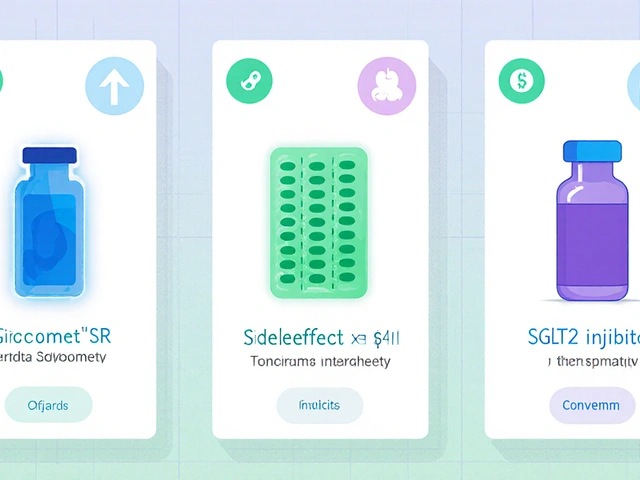Picture this: your doctor prescribes irbesartan to lower your blood pressure, and you look it up online, hoping it’s just another standard pill. Then—bam, you see stories about allergic reactions, people describing rashes or swollen lips. It’s like the medication has a hidden wild card, and suddenly you’re wondering: am I at risk? Should I worry about breaking out in hives or gasping for breath in the middle of dinner? Allergic reactions to medications aren’t just drama for the movies, but with irbesartan, how common are they really? And what should you watch for, if you or someone at home takes this tablet every day?
Understanding Irbesartan: Why Take It, and How Allergies Happen
If you’ve ever wrestled with a prescription, you’ve probably noticed that even the most ordinary drugs have a laundry list of possible side effects. Irbesartan isn’t some rogue experimental treatment—it’s a tried and tested medication millions rely on for keeping their blood pressure in check. It belongs to the angiotensin II receptor blocker family. What does that mean for you? Basically, it relaxes blood vessels, making it easier for your heart to do its job and for blood to circulate at healthier levels. Doctors like to prescribe irbesartan because it also protects your kidneys, especially if you’ve got diabetes.
Now, about allergies: our bodies are dramatic, reactive things. An allergy to irbesartan means your immune system confuses the medication for an invader—like pollen or nuts. It goes a bit haywire, which can show up as rashes, swelling, or itchiness. Sometimes it gets serious, leading to angioedema—a fancy term for swelling that hits deep under your skin, lips, eyelids, or tongue. Rare, but when it happens, you need help fast. Studies show that allergic reactions to irbesartan are uncommon; research from 2018 in the Journal of Clinical Hypertension found adverse skin reactions in fewer than 0.5% of patients. But that doesn’t mean you can just ignore even the tiniest rash or unexpected swelling.
Doctors don’t normally test everyone for allergies to irbesartan before prescribing it—unless you’ve already had issues with similar drugs, like losartan or valsartan. What’s cool is that adverse reactions usually pop up early, within days to a few weeks. But here’s the tricky part: allergies can show up after months, and sometimes, only when you pair irbesartan with another new medication or supplement. Our bodies are annoyingly unpredictable that way.
| Side Effect | Frequency (%) | Time to Onset |
|---|---|---|
| Mild rash | 0.5 | Days to weeks |
| Swelling (angioedema) | 0.2 | Hours to weeks |
| Hives | <0.1 | Hours to days |
| Respiratory symptoms | <0.05 | Hours |
The best way to dodge trouble is to pay close attention in the first month and don’t brush off unusual changes, even if you think they’re unrelated – like facial puffiness or mild itching. If you’re the forgetful type, some folks even jot down how they feel each day for that first stretch, especially after starting a new medication. It might sound extreme, but for peace of mind, it works.
Spotting Allergic Reactions: Real-Life Signs and What to Do
Most people picture allergies as sneezing or watery eyes—not exactly the red flags that get you to call a doctor. When it comes to irbesartan, the allergy symptoms to watch for can get a bit weird. One morning, your lips are a little swollen. The next, there might be hives or a blotchy rash. Maybe your throat feels tight or your voice croaks, especially if it’s never happened before.
I still remember a guy at my gym, Shawn, who started irbesartan and just brushed off tingling fingers for days. He thought he’d lifted wrong. Turns out, he was developing an allergy—his face swelled up, and he landed in the ER. He’s fine now, but it taught him and everyone around a lesson: don’t ignore weird skin or sudden puffiness. Swelling in the tongue, lips, or around the eyes can be the start of something serious, like angioedema, which can block your airway.
If you develop any of these symptoms, especially angioedema irbesartan is a phrase your nurse or doctor will take seriously. The first step is always: stop taking the pill and call your healthcare provider. Save the bottle, snap a picture of your symptoms, and share them with your doctor—don’t try to tough it out. If you’re choking, having trouble breathing, or your tongue is ballooning, drop everything and get to emergency right away. Even if things settle down, you should get checked out. According to the FDA database, less than 1 in 1,000 people prescribed irbesartan develop a severe allergic reaction; but among those who do, about 30% require hospital care for breathing support or IV steroids.
What makes allergies to blood pressure meds more insidious than, say, peanut allergies is that most people don’t expect them. Irbesartan’s package insert will highlight allergic and skin reactions, but it’s buried under pages of other side effects—like dizziness, tiredness, or cough. That’s why you need to stay alert during the first weeks, and let your doctor know about any unexpected change, especially if you already have a history of allergies.
Sometimes doctors will recommend an alternative med, like switching to a calcium channel blocker or a different class of blood pressure pill, if you’ve had trouble before. If you live with someone who takes irbesartan—like my friend’s dad, who’s stubborn as a mule—keep an eye out for subtle shifts. Abigail always says I worry too much, but when her uncle showed up with puffy eyelids and insisted it was just lack of sleep, it turned out irbesartan was the culprit.

Irbesartan and Cross-Reactivity: What If You’ve Had Problems with Other Meds?
Here’s a question people rarely think to ask at the pharmacy counter: If I’m allergic to one blood pressure med, am I safe with others? The science gets a little tangled. Irbesartan is in the angiotensin receptor blocker (ARB) class, while drugs like enalapril and ramipril belong to ACE inhibitors. The two use different mechanisms to drop your blood pressure, but in a few rare cases, the allergies seem to overlap—especially with angioedema.
If you had a serious reaction to an ACE inhibitor, your doc might be extra careful starting you on irbesartan. One study from the New England Journal of Medicine found about 2% of people who had angioedema from ACE inhibitors, like lisinopril, went on to have a similar reaction to ARBs, including irbesartan. Not a huge risk, but it’s there. That’s why if your med history includes rashes or swelling from any blood pressure med, your doctor will likely start you off under close watch, maybe in the office or with regular follow-ups.
As for mixing irbesartan with supplements or other drugs, the wildest reactions often come from unexpected combos. For example, NSAIDs—think ibuprofen—can increase your risk of kidney injury if you’re on irbesartan, and that alone can lead to odd skin or allergy-like symptoms. Data from the CDC shows that new prescriptions added to your routine are when reactions often surface, so always update your medication list with your care team.
Curious about at-home allergy tests or over-the-counter remedies? Allergy blood tests are rarely useful for medication allergies. Skin testing is sometimes used for penicillin but almost never for ARBs. The only safe option is awareness: take note of anything unusual, and communicate fast. I know it sounds basic, but tracking symptoms even in your phone’s notes app can make the difference between catching a mild reaction and ending up in the ER.
“Although the incidence is low, the potential severity of irbesartan-induced angioedema warrants vigilance during initial treatment, especially in patients with a history of drug-induced swelling.” — Dr. Tony Ortega, Clinical Pharmacologist
Practical Tips: Managing Risks and Keeping Your Peace of Mind
If you or someone close to you needs to take irbesartan, you don’t want to live in fear—but it pays to have a quick plan just in case. Here’s what most doctors (and people who’ve been through it) wish they’d known the first time around:
- Always double-check your pill bottle the first time you get a new prescription. Medication errors can happen, and getting the wrong drug might increase allergy risk.
- If you start irbesartan, note any new skin changes, swelling, or itching—especially in your face or throat. Don’t dismiss ‘tired looking’ eyes or puffy lips.
- If you do get a strange reaction, hang onto your bottle and any creams/supplements you took that day. It helps doctors work out if the combo is to blame.
- Get to know the terms: ‘angioedema’ means swelling below the surface of the skin, affecting lips/tongue/throat—this can block airways, so treat it as a 911 situation.
- Don’t try to ‘wait it out’ if things suddenly get worse. Quick decisions can be life-saving.
- Mild rashes or hives without other symptoms? Call your doctor before your next dose—don’t just skip or stop on your own, unless symptoms escalate.
- Let family know you’re starting a new blood pressure med, and show them what allergic reactions look like—especially if you’re prone to allergies in general.
- If you’re prescribed an EpiPen due to previous severe allergies, keep it nearby, even if you’ve never used it for medicines before.
- High pollen or allergy seasons won’t increase your risk of developing irbesartan allergies, but they can make it harder to tell what’s causing your symptoms. Keep track of triggers.
- Ask your doctor or pharmacist for a side effect calendar, or use an app to note symptoms by date for peace of mind.
Irbesartan can be a life-changer for people struggling with their blood pressure—especially folks whose kidneys need extra help. But even the best medication can have quirks. The key is to balance the benefits with smart, everyday vigilance—pay attention for real-life, not textbook, signs of allergy, and don’t tough it out if something feels off. No one expects to be the rare case, but as my friend Shawn will tell you, it can happen. Trust your gut, communicate with your healthcare team, and don’t hesitate if you think something’s wrong. That’s how you stay safe, informed, and in control of your health, without living life on edge.








I took irbesartan for 3 weeks and woke up one morning with my lips looking like I’d been kissed by a balloon animal. No joke. I called my doctor at 6 a.m. He said, 'Oh, that’s the one.' I thought he was joking. He wasn't. I switched to amlodipine. No more puffiness. Don’t ignore it. Seriously.
In India we call this 'medicine surprise'-you take it thinking it’s just another tablet and suddenly your face is doing the moonwalk. My uncle had the same thing with losartan, and they said it’s like your body saying 'nope, not today.' I keep a list of all meds now. Even my chai-wallah knows my drug history.
I started irbesartan last month and noticed a tiny rash on my neck. Didn’t think much of it. Then I read this post. I called my pharmacist. She told me to stop and come in. Turns out it was a reaction. I’m so glad I didn’t brush it off.
This whole thing is overblown. You're telling me people panic over a little swelling? My cousin took this for 5 years and never had an issue. Probably just scared of needles or something. Just take the pill and stop reading Reddit.
Ah yes, the modern miracle of pharmaceuticals-where your blood pressure drops and your face swells like a balloon at a child’s birthday party. We’ve turned medicine into a Russian roulette game where the bullet is labeled 'rare' but the trigger is always pulled. And yet, we still trust the same companies that sold us vaping and opioids. Brilliant.
Irbesartan? More like irbesar-NOPE. I read the FDA report. 0.2%? That’s still 200 people per 100k. And the docs don’t even warn you? Sounds like they’re just trying to hit their prescription quotas. Also, why do all these meds have the same side effects? Coincidence? Or corporate cover-up? I think it’s the latter.
Thank you for writing this. I’ve been on irbesartan for two years and never knew about the cross-reactivity risk. I had a mild rash once but didn’t connect it. I’ll be more careful now. Your tips are practical and kind.
This is all a marketing ploy. The FDA and Big Pharma want you scared. Swelling? That’s just water retention. Hives? Stress. They know people panic and keep refilling prescriptions. I’ve been on this drug for 7 years. No issues. You’re being manipulated.
You got this. 🙌 If you feel weird, stop and call your doc. No shame. I was scared too when I started my med. Now I use a little app to log symptoms. It’s like a health diary. Super helpful. You’re not alone. We’re all figuring this out together.
So you’re telling me the same drug that saves your kidneys can also turn your face into a puffball? Sounds like a sci-fi movie where the cure is also the curse. I’m just here for the drama.
The statistical insignificance of these adverse events must be contextualized within the broader epistemological framework of pharmacovigilance and the institutionalized neglect of patient-reported outcomes. One must question the ontological primacy of pharmaceutical corporations in defining 'normalcy' and 'risk.'
People who panic over a rash are the same ones who think gluten gives them anxiety and that 5G is turning their kids into zombies. You think your body’s allergic to a pill? Maybe it’s just your mind being dramatic. Take the damn pill and stop Googling.
This is why America is falling apart. We’re too soft. Back in my day, you took your medicine like a man. If your lip swelled, you put ice on it and kept going. Now we have people writing novels about hives. Get tough. Stop whining. And for God’s sake, don’t let your kids grow up thinking every pill is a death sentence.